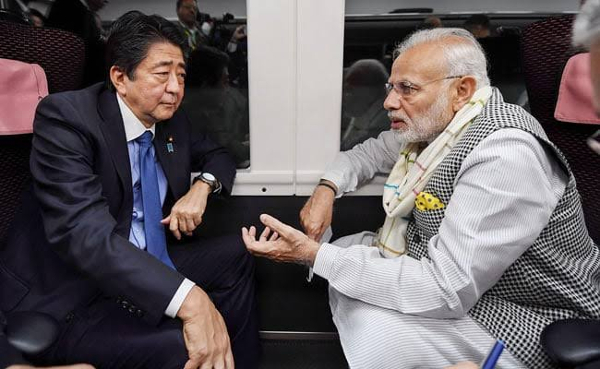The recent 2+2 meet in Delhi this past weekend serves as a breakthrough for India-Japan relations. One can expect increased, strategic cooperation and bilateral strategy. The meeting resulted in some really cool, non-cliché ways that India-Japan will build their strategy. And as a global geopolitical shift takes place from West to East, an alliance between the world’s largest democracy and the world’s most technologically advanced democracy could just be the one to really watch out for. Here’s how:
Fighter Jets
Indian and Japanese fighter jet exercises are to begin taking place in Japan. To add to that, the two nations also will accelerate talks for a defence pact which involves sharing resources including food, fuel, ammunition, equipment and transportation. Sounds like a semi ally to me – something similar to what Australia and the United Kingdom have now. Why is this so important? Two reasons: First, the geo-location of India is south-central and far-east Asia; two active parts of the Indian Ocean in terms of trade and ocean strategy. India and Japan will be able to share information on developments both for security, trade and oil transport. Second, the alliance would check back China’s ocean strategy. Currently, China is drafting a South China sea of conduct code and continues to influence South Asia with its Belt and Road infrastructure-building initiatives. Hands down, a strong India-Japan alliance would save both India and Japan any future ‘headaches’ of China’s unwanted drama.
Robotics
Ministers at the 2+2 agreed to ramp up joint research on robotics, unmanned land vehicles and artificial intelligence. Earlier this year, there has been a project arrangement on joint research on global navigation satellite system augmentation technology for UGV/robotics. Working together on these projects is extremely critical to the deeper development of technology and collaboration. Collaboration on technology projects boosts bilateral relations and defence relations automatically. Furthermore, tech project collaboration can also open up manufacturing and trade opportunities between India and Japan. This can be possible in public and private spheres.
Stability
Efforts were also made to review the progress of India’s Act East Policy and Japan’s Free and Open Indo Pacific Vision. The Act East policy cultivates economic and strategic relations with South-Eastern countries to strengthen the influence and counter China’s influence. The Free and Open Indo-Pacific Vision improves connectivity between the Pacific and Indian Oceans. With this vision, Japan wants to strengthen collaboration with India, the USA and Australia. Both items aim for peace and prosperity. Moreover, collaboration on both policies would ensure stability in the region. China’s growing military and economic influence in the Indo-Pacific region is concerning for many Asian countries. A broad Indo-Pacific approach initiated and followed through by India-Japan would foster regional peace and stability.
Japan-India relations have traditionally been strong. The 2+2 significantly bolstered this alliance. In addition to this, PM Narendra Modi and Shinzo Abe also have a Nuclear deal from 2016 which gives Japan the right to supply fuel, nuclear reactors and technology to India. It resulted in helping build six nuclear reactors in southern India which exponentially increases India’s nuclear energy. The two countries also have a Japan-India Consortium Forum (JCIF) which helps foster infrastructural development in northeast India. Active collaboration on defence, technology and stability will make the Indian-Japan relationship an Asian power play alliance and one that globe would definitely make note of.
Source: WION
Image Courtesy: NDTV
You may also like
-
IAF Aircraft Set Course For Exercise Eastern Bridge VII At Oman
-
India-us Working Together In Areas Like Critical Minerals, Supply Chains And Advanced Technologies: Shri Piyush Goyal
-
Defence Secretary to co-chair 5th India-Philippines Joint Defence Cooperation Committee meeting in Manila
-
2nd India-Japan Finance Dialogue held in Tokyo on 6th September, 2024
-
Prime Minister, Shri Narendra Modi welcomes Crown Prince of Abu Dhabi
